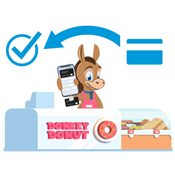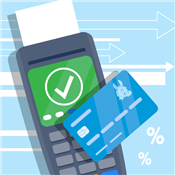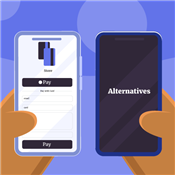Merchant Account Requirements
Does your business qualify for a merchant account? Here are 10 merchant account requirements you need to provide for your application.
 |
To open a merchant account, you need to go through an underwriting process. Essentially, the provider wants to know how risky you'll be to them.
To ensure it goes smoothly, gather all the information before starting your application.
Each merchant account provider may have its own set of requirements. But in general, you need these 10 things to qualify for a merchant account.
Let's go over these requirements in more detail below. Plus, learn which reasons might prevent you from being approved and the top providers to consider.
1. Business License
You need an official business license from the city/state that you operate in. Merchant account providers will check your license to verify that your business is legit.
Each state, and even city/county, has its own business license requirements. This could include a state business license, local license, or DBA. Make sure you check with your state to see what's needed.
2. Employer Identification Number (EIN)
An EIN is used to identify your business and report business taxes. If you don't have an EIN, you can apply for one for free on the IRS website. The number is issued immediately.
For sole proprietors with no employees, you can apply with just your Social Security number. But if you do have even one employee, then you must get an EIN.
3. Business Bank Account
You need a business bank account, even as a sole proprietor. You'll be asked to provide your business account routing number on the application.
Your business account is where the merchant services provider will deposit funds from your credit card transactions (minus processing fees).
It's important for your business bank account to be in good standing. If you have a low balance or issues like overdrafts, you'll be seen as riskier.
4. Voided Check
In most cases, you also need to upload an image of a VOIDED check to confirm your business account info.
Make sure that your name (if sole proprietor) or business name, account number, and routing number are clearly visible.
If you don't have checks available, you can submit a bank letter instead. The purpose of the letter is to confirm that you have an account at the bank. It should also state your account and routing numbers. This is something you can request from your bank.
5. Certificate of Formation
Unless you're a sole proprietor, you need to file legal documents with your state government (usually the secretary of state) to make your business officially recognized in your state. It's different from a business license.
LLCs need to provide Articles of Organization. And corporations need to provide Articles of Incorporation.
Each state has its own forms. You can file from your Secretary of State office website.
6. Physical Address
You'll need a place to receive forms and statements from the merchant account provider.
For brick-and-mortar businesses, you can use the address of your business location. For online businesses without an office, it's okay to use your home address.
7. Financial Statements
Typically, you'll be asked to provide your business financial statements, like banking statements and tax returns. Depending on the size of your business, you could be asked to provide up to 2 years of financial statements.
You may even need to provide personal financial statements, especially if you have a short business history. Providers want to make sure that you are responsible with money in your personal life too.
8. Previous Processing Statements
If you are already processing credit cards, have at least the past three months of your processing statements ready.
Your processing history tells the provider how much you usually process a month and if there are any issues. The more you need to process, the more information they may require.
The provider will look at how often chargebacks occur and if they're valid, legit reasons. Having a lot of chargebacks means higher risk for the processor.
9. Supporting Business Documents
The provider might also request supporting documentation to see how you operate your business. You may be asked to provide:
- Business plan
- Billing policy
- Shipping procedures
- Guarantees and warranties
- Refund and exchange policies
- Inventory reports
Basically, they're looking to see if you have the proper customer procedures in place to reduce chargebacks.
These kinds of supporting documents may not be needed for all businesses. But it's best to have them prepared just in case to help the underwriting process go smoother and faster.
10. Security Procedures
All businesses need to comply with Payment Card Industry (PCI) standards to protect customer card data.
If you run an online business, it's important for providers to see that you have adequate security measures in place to prevent data breaches. This includes SSL certification for protection and encryption of your website.
Reasons You May Not be Approved
So, you provided all the above documents and still got denied for a merchant account. It's very frustrating.
Here are some common reasons why you may not be approved:
You're a high-risk business
Some businesses are considered to have higher risk of fraud and/or failure. A lot of providers don't want to work with those types.
Some examples include CDB, travel companies, auto parts and accessories, electronics, financial services, and adult entertainment.
If your business falls in a high-risk category, it's best to go with a specialized high-risk merchant account provider. They know more about how to work with your unique needs.
You have high processing volume
The more you process a month, the higher the risk of chargebacks. Some providers see that as a risk they don't want to take on. This is also true if your business has an unusually large average ticket size.
You have low personal credit
Merchant account providers want to see that you, the business owner, are responsible with finances. If you have bad personal credit, it could raise red flags.
But even if you have a lower score, it doesn't mean you can't be approved. In that case, they may go off your business statements instead.
You're a new business
A lot of new traditional merchant account providers don't want to work with new businesses. They want to see some solid processing history first.
Most new businesses use a third-party processing provider (like Square) to process cards without a merchant account. But the downside is that rates are higher.
If you want the benefit of lower rates, Helcim is one of the few merchant account providers who will work with new businesses.
How Much Does a Merchant Account Cost?
A merchant account will come with a lot of fees. They may not always be disclosed upfront.
Make sure you understand all the potential fees when shopping for a provider. Choose one that offers the best value.
Merchant account fees could include:
- Set up fee
- Monthly fee or annual fee
- Processing fees for each transaction
- Equipment costs
- Fees for features like payment gateway, invoicing, recurring billing, virtual terminal, etc.
- Monthly minimums
- Chargeback fee
- Early cancellation fee
- Statement fees
- PCI compliance fee
In general, you can expect the overall cost to be 2.5% - 3.5% of your processing volume. This means if you have $10,000 in credit card sales each month, your processing costs will be $250 - $350.
High-risk businesses can expect higher total fees around 3.5% - 5%.
Merchant Account Providers
When choosing a merchant account provider, consider their processing fees, features, and whether they help you maintain PCI compliance. Here are some of our top picks for merchant account providers.
Payment Depot
Payment Depot is great for high-volume businesses because you get direct access to the interchange rate with 0% markup. They charge a membership fee that includes a payment gateway and virtual terminal.
Their fixed-rate pricing can come out cheaper than other pricing models. The basic plan costs:
- $79 per month (process up to $250,000/year)
- In-store: Interchange rate + $0.08 per transaction
- Online: Interchange rate + $0.18 per transaction
Dharma
Dharma offers low pricing that's best for mid-large companies processing more than $10,000 per month.
- In-store: Interchange + 0.15% + $0.07
- Online: Interchange + 0.20% + $0.10
- $25/month for retail, online, restaurant
Dharma doesn't require a contract or have monthly minimum requirements. Each account includes free access to a payment gateway from MX Merchant, which also includes a virtual terminal.
Bottom Line / Key Takeaways
Don't worry if all of this sounds overwhelming. The provider just wants to know how risky you are as a client. If you have good credit and your business is easily verified, you could be approved in as little as one day.
Here are some last notes to ensure a smooth process:
- Get your business license, EIN, formation documents, and business bank account before applying.
- Prepare your financial statements, supporting documents, and previous processing statements beforehand.
- Make sure you understand all the potential fees associated with the merchant account before you commit.
Check out our list of the best credit card processing providers to find the right one for your business.
Anna G is a research director at CreditDonkey, a credit card processing comparison and reviews website. Write to Anna G at feedback@creditdonkey.com. Follow us on Twitter and Facebook for our latest posts.
Note: This website is made possible through financial relationships with some of the products and services mentioned on this site. We may receive compensation if you shop through links in our content. You do not have to use our links, but you help support CreditDonkey if you do.
Not sure what is right for your business?
|
|
|
Answer a few short questions in our credit card processing quiz to receive tailored recommendations to help you keep more profits.
|
|
|














